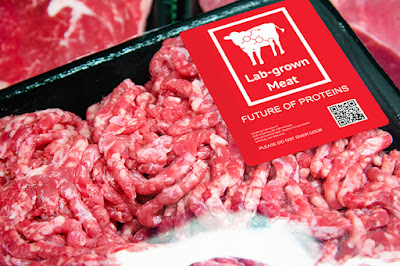Lab-grown meat: From Future Perspective
Lab-grown meat is properly
known as cell-cultured meat because the scientific process by which the meat is
made is cell culture or tissue culture.
Fat or muscle stem cells are
taken from either a live, healthy animal via a painless biopsy, or one which is
already in the meat processing system. For poultry species, cells can be taken
from eggs.
The cell is placed in a
large stainless-steel tank called a cultivator where it is fed nutrients until
it divides and grows. The cell is also given growth factor components, which
are signals that tell it what to do.
 |
| Will you like to eat Lab prepared Meat? |
The process takes two
to three weeks depending on the type of meat being produced. In the end, the
cells grow into a whole meat piece and is shaped into burgers, nuggets or
chicken strips.
Memphis Meats, another
California start-up, wants to bring lab-grown meat to the mainstream.
Vice President Steve Myrick
says, 'We need a collaborative effort from major food industries so we can
achieve food security across the world, including every region and income
level.'
Cardiologist Uma Valeti, stem cell biologist Nicholas
Genovese and tissue engineer William Clem founded Memphis Meats in 2015. The
San Francisco based company has received investment from Richard Branson and
Bill Gates.
Advantages
of alternative meat
Alternative meats are one
answer to our appetite for protein. Both technologies offers a 'real' meat
taste without many of the issues that come with farming, including animal
cruelty.
'We stabilize the cells so
we can continue to use them indefinitely,' explains Steve. 'The cells we're
using now were originally procured three to four years ago. We're aiming to go
completely animal-free in future.'
Both approaches also avoid
risks that come with conventional farming, which is often responsible for
viruses that transfer from animals to humans. Meat markets are thought to be
the source of COVID-19, the pandemic that stopped the world in 2020.
Likewise, scientists can be
clearer about what's going into both plant-based and lab-grown meat and are in
complete control of the nutrition profile. For instance, they can adjust the
ratio of good and bad cholesterol and fatty acids in a product.
'We've found there are a lot
of ways of fine-tuning the end product based on what we do at that stage, like
the feed we give the cells and some of the decisions and production processes
we go through,' says Steve. 'We can really adjust the taste, texture, aroma and
in some cases, nutrition profile.'
Another big advantage of
alternative meat is nothing goes to waste. In a cell-culturing process,
scientists only produce what is needed, and leave out brain, bones and skin.
And in a vegan burger, no animal parts are needed at all.
'With cell-cultured meat, we
only need to produce the product that ultimately goes to the consumer,' says
Steve.
Both lab-grown and
plant-based meats have big sustainability claims.
'Humans only receive about
3% of the raw materials that goes into a cow,' adds Chris at Impossible Foods.
'Farmers work really hard to generate corn and soy and by funnelling it through
cows, 97% of that usually ends up in water or atmosphere as greenhouse gases.
'Can you imagine any other
commodity industry on the planet like oil or mining, throwing away 97% of their
raw materials?'
And while there is some
unavoidable waste in terms of energy and water when producing lab-grown meat,
it is significantly less than conventional farming.
Health credentials
A spokesperson for British
Nutrition Foundation (BNF), a British charity that provides impartial, factual
information on food and nutrition, says, 'It is too early to tell whether
lab-grown meat could have any negative effects.
'There isn't any information
on the nutritional profile of such food, although it may be possible to
manipulate it so it has the same nutritional value as conventional meat.
'This depends on what is
achievable when making lab-grown meat on an industrial scale, and what
consumers want from these products.'
Chris says, 'Right now, our
plant-based meat matches conventional meat. In future, our products will be
healthier and more nutritious than the animal product as we control every
ingredient that goes into it.
'We will also probably have
to make a plant-based meat for everything to really tackle conventional
agriculture - from swordfish sashimi to quail eggs.'
We know more about how good
plant-based meat can be for the body.
BNF says, 'For plant-based
meat alternatives, the recommendations would be to choose options that are
lower in saturated fat and salt.
'Foods based on vegetables
and pulses tend to be lower in saturates and calories and higher in fibre than
a meat-based product, but replicating the taste and texture of means you need
to add a certain amount of fat and salt to get a similar profile, so these
products could be less healthy options.'
Future
It is unlikely real meat will
be completely eliminated any time soon. Some parts of the world rely on it, and
the future of meat production will most likely be a combination of all three
methods.
Steve says, 'I anticipate
Memphis Meats products going mainstream in the next 10 to 20 years but also
being a part of the human diet alongside conventional meat, plant-based meat
alternatives, and a number of other protein sources. We need all the tools in
our toolkit to feed humanity.'
Chris says, 'In 50 years from
now, the science driven food - whatever that ends up looking like - will taste
better and be cheaper than the animal derived food.
'We're starting to move in the
right direction, but the question is, are we moving fast enough? Can we stop
people eating meat fast enough to save the rainforest?'
